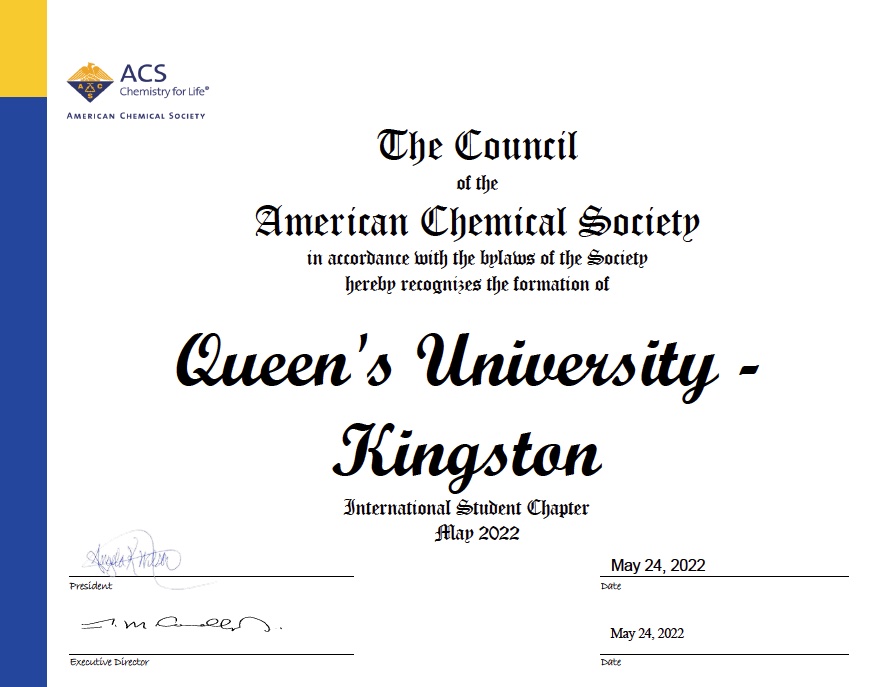
The ACS is officially recognized as one of the world’s largest scientific organizations, with a membership in excess of 150,000 individuals. Within the U.S., there are presently 185 Local ACS Chapters, wherein members can connect with other chemists and chemical engineers in their respective geographies, participate in professional development activities, and contribute to the public’s understanding of chemistry at a community-level. Globally, the ACS is represented in more than 140 countries. At the student level, there are currently 29 countries (excluding the U.S.) with ACS International Student Chapters, with India having the largest number of colleges/universities with Chapters. In Canada, there were previously only two Chapters – Mount Allison University (Sackville, NB) and University of Toronto Mississauga (ON). However, there are now three, given the recent approval of the Queen’s University Student Chapter of the ACS. Chapter planning began in March 2022, with thanks owed to Jessie (Jess) Deng (Co-founder), Dr. Farnaz Heidar-Zadeh (Faculty Advisor), Nancy Wu (Department Financial Coordinator), Dr. Christina McCoy (ACS), and Susan Flinn (ACS). With their assistance, the Chapter applied for and received an ACS Student Chapter Charter grant, valued at $300 USD (~$375 CAD). Graciously, Lindsey Lee (Department Manager) and Dr. Richard Oleschuk (Department Head) fund-matched the Charter grant with an additional $375 CAD. Furthermore, a member donation of $250 CAD as a result of a winning-submission in the Queen’s University Art of Research Photo Contest has positioned the Chapter with a total of $1,000 CAD in start-up funds for the upcoming 2022-23 academic year.
In order to be an officially-recognized ACS Student Chapter, an International Student Chapter Application needed to be submitted, requiring a minimum of six members (undergraduate and/or graduate) with ACS memberships ($25/55 USD undergrad/grad). Thanks are owed (Ordered alphabetically by surname) to: 1) Joshua (Josh) Innis 2) Julia McPhail 3) Daisy Nebel 4) Alessia Rizzello and 5) Max Van Zyl. Josh, Julia, Daisy, and Alessia, all of whom are/were Departmental Student Council (DSC) members, were able to utilize the Department’s Student Recognition reimbursement to fund their ACS memberships, while Dr. Heidar-Zadeh generously covered her summer research student Max’s membership. On 24-May-2022, the Chapter and its bylaws were approved and certified by the ACS.
Simply put, ACS offers a lot of funding and programming “to support excellence in chemistry, celebrate achievements, [and] advance the chemical sciences through research, education, and community projects.” Once ACS approved the Chapter, I wanted to cut the brake line and pin the throttle so-to-speak and leverage our status as an official Chapter to maximize the opportunities available to us. To date, I think the Chapter has done just that, as evidenced by two examples just within the month of June: 1) Implementing the ACS Graduate Student & Postdoctoral Scholars Recognition Program and 2) Hosting a 95th Anniversary of the Women Chemists Committee (WCC) event. With respect to Example #1, thanks are owed to Dr. David Zechel (Graduate Studies Coordinator), Samantha (Sam) Hollands [Incoming Queen’s Graduate Chemistry Society (QGCS) President], Jennifer (Jenny) McLeod [Outgoing Queen’s Chemistry – Inclusivity Diversity Equity and Awareness Society (QC-IDEAS) President], and Mark Aloisio (Incoming QGCS Secretary), as well as all of those who submitted nominations. By way of the Recognition Program, several graduate students and postdoctoral scholars will be formally recognized by the ACS in the categories of 1) Leadership in Mentoring 2) Leadership in the Promotion of Research Safety and 3) Leadership in the Promotion of Diversity, Equity, Inclusion, and Respect (DEIR); these nominated individuals will receive official ACS Certificates. In terms of Example #2, thanks are owed to Semora Smith (ACS), Dr. Amy Balija (ACS WCC Chair), Dr. Amanda Bongers (Chemistry), Angela (Ange) Lyon [Queen’s Women’s Network (QWN) and Queen’s Partnerships & Innovation (QPI)], Dr. Shoma Sinha (QWN and QPI), Brooke Ring [Women in Science at Queen’s (WiSQ)] and Tina Tabrizizadeh/Rachel Shum (Bonds for Success/CIC – Kingston). The aforementioned individuals contributed to the Chapter’s WCC event, all within the framework of advocating for women to positively impact diversity, equity, and inclusion in the ACS and the chemical profession at large. The Chapter gratefully acknowledges funding support ($100 USD reimbursement) from the “95th Anniversary Celebration of the WCC” grant program.
The thing that has most stood-out to me as an American in Canada, especially in the Department, is a welcoming sense of community/oneness as opposed to the individualistic “Me-versus-You” attitude to which I had become accustomed in most of the chemistry settings I previously experienced. The Latin title “E Pluribus Unum” is a traditional motto of the United States, “Out of many, one.” I chose this phrase because even though the official name is the “Student Chapter of the ‘American’ Chemical Society,” I believe this discussion of the Chapter evidences the many contributions of diverse individuals, the collection of which transcends any one particular culture/nationality and is unified by mutual interest in chemistry. It is my hope that by starting this Chapter, I can contribute to our Departmental community, especially by connecting our Membership and affiliates (Undergrad, Grad, Postdoc, Faculty, & Staff) with relevant opportunities. As an example, recent ACS member and Chapter-affiliate Dr. Lishen Zhang (Chemistry) applied for and was accepted to the funded ACS Postdoc-to-Faculty (P2F) Workshop being held in Portland, Oregon USA this summer. Congratulations Dr. Zhang!
I hope to see the Chapter Membership grow this fall within the Department, as well as recruit from related Departments/Faculties like Biology, Chemical Engineering, Physics, etc. Ambitiously, I want the Chapter to strive for the following: 1) The Alma Mater Society’s (AMS) “New Club of the Year” award 2) an ACS “Student Chapter” award and 3) recognition as an ACS “Green Chemistry Student Chapter,” among other opportunities – When you think that’s just as hot as it gets, you can always shovel-on a little more coal. Needless-to-say, these goals are not attainable without member involvement, so please contact me if you want to contribute. Fiscally-, philosophically-, and generally-speaking, the Chapter is off to a good start, but I am excited to see the Chapter’s continued growth and progress. -Dan